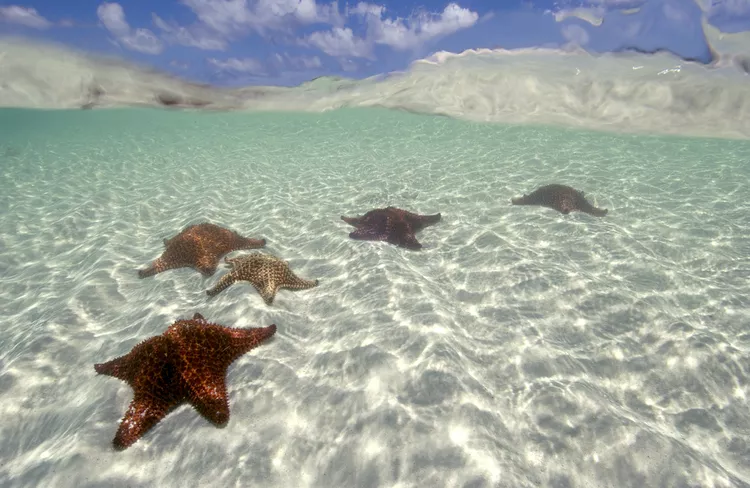Summary
Many travelers think of the Bahamas mostly in terms of Nassau and Freeport — the biggest cities on the most populous islands — but this archipelago bordering the Atlantic Ocean and the Caribbean Sea actually consists of 29 islands plus hundreds of cays. Lightly settled and largely unexplored by casual tourists, the Out Islands of the Bahamas are more well-known to anglers, divers, and nature lovers as pristine outposts of solitude and “old Caribbean” lifestyle. These (mostly) small specks of land are also home to dozens of resorts, mostly located on the bigger islands profiled below.
Rum Cay, San Salvador, Acklins, Cat Island, Crooked Island, Mayaguana, Inagua
San Salvador is famous as Christopher Columbus’ first landfall during his voyage of discovery in 1492, while Rum Cay is known for the famous shipwreck of the HMS Conqueror — in fact, the island is named for a wreck that deposited a load of rum on its shores. Acklins and neighboring Crooked Islands are beloved by divers and fishermen for their shallow, clear waters. Moreover, Cat Island and Mayaguana boast some of the most untouched beaches in the Bahamas. Inagua, an ecotourism hotspot, is known for its resident population of flamingos and other seabirds.
The Exumas
:max_bytes(150000):strip_icc():format(webp)/bahamas5-b43091832a104dc9aa67ee076732b7eb.jpg)
The Exumas are a striking 130-mile archipelago of islands made up of 360 cays — islands formed on the surface of coral reefs. As such, it’s a premier destination for snorkelers, divers, and other lovers of open water. Consequently, explore the Exuma Cays Land and Sea Park, which encompasses 174 square miles of protected public and private cays teeming with marine life.
You’ll need somewhere to stay, however. Great Exuma, the largest cay, and its capital, George Town, offer an array of modest and luxurious accommodations, from genteel spas to large all-inclusives, notably the Sandals Emerald Bay, the sole five-star resort in the Bahamas. There’s even a golf course for enthusiasts.
The Abacos
:max_bytes(150000):strip_icc():format(webp)/Joe_Albury_with_one_of_his_creations-56a38f465f9b58b7d0d28b68.jpg)
A haven for British Crown Loyalists fleeing the mainland during the American Revolution, the Abacos differ in temperament from the rest of the Bahamas. Settlements are scattered throughout a dozen cays and small islands; the largest, Marsh Harbor, has a modest population of just 5,000. Here, boatbuilding and fishing are significant parts of the local economy rather than mere attractions for tourists.
There are a few large hotels, notably the Treasure Cay Hotel Resort and Marina and the Abaco Beach Resort in Marsh Harbour. Nevertheless, most accommodations are small villas and cottages. Sailing and eco-tourism reign supreme; visitors can island-hop, fish, and explore unique pine forests with their wild boar and deserted beaches.
Andros
:max_bytes(150000):strip_icc():format(webp)/GettyImages-125212128-584842f25f9b5851e5e193cc.jpg)
Andros—comprised of North Andros, Mangrove Cay, and South Andros—is the largest island in the Bahamas. Notably, it is also one of the most lush and least populated islands.
Subterranean limestone caves, pine and mahogany forests, and rich, thick tangles of endless mangrove are hallmarks of Andros. This is an island for nature-oriented travelers, including bird-watchers, photographers, kayakers, and all-around pathfinders. Furthermore, Andros is renowned for its excellent bonefishing, sailing, and well-established dive sites, with the third-largest barrier reef in the world off its east coast. In October, Andros hosts the All Andros Regatta, a day of sailing races featuring more than sixty locally constructed sloops.
Eleuthera
:max_bytes(150000):strip_icc():format(webp)/eleutherarays-56a392633df78cf7727dff44.jpg)
The long, skinny island of Eleuthera stretches 110 miles and is one to two miles wide, providing ample beach space. Explorers will relish the island’s unusual natural land formations, such as the Glass Window Bridge, which offers elevated views of the Atlantic Ocean and Exuma Sound, and the Ocean Hole—a “bottomless” natural limestone sink. Moreover, the Atlantic side of nearby Harbour Island boasts stunning pink coral sands.
Numerous hotels and cottages are scattered throughout Eleuthera and on Harbour Island. These range from quaint villas and small resorts to hideaway cottages, with the best dining, nightlife, and shopping found in Gregory Town and Governor’s Harbour.
Long Island
:max_bytes(150000):strip_icc():format(webp)/DSC_8585-ab4843c5c5784b1fa0ed0373867ce4ed.jpg)
If you’re looking for nightlife, Long Island may not be your ideal destination. Nevertheless, it is the animal husbandry hub of the Bahamas. This island compensates for its lack of a vibrant social scene with a wealth of activities such as fishing, sailing, yachting, and diving, all set against the backdrop of an island often regarded as the most beautiful of all the Out Islands.
Long Island boasts salt ponds, old plantation houses, pink sand beaches, and prehistoric caves filled with ancient cavern drawings. Snorkeling at Poseidon Point reveals spy tarpon winding through the island’s coral reefs; alternatively, diving at Dean’s Blue Hole, which is 663 feet deep, allows for an extraordinary underwater experience.
Bimini
:max_bytes(150000):strip_icc():format(webp)/GettyImages-10181692-584843bc3df78c02302fdfbf.jpg)
Bimini is another slender island, measuring just seven miles long and no wider than 700 yards. Actually comprising two islands—North and South Bimini—this is the prime destination for big-game fishing and serves as a stopping point for deep-sea fishermen from Florida, located just 50 miles to the west. Diving is also popular, particularly at the wreck of the SS Sapona, which once served as a floating warehouse for illegal liquor during Prohibition. Furthermore, the “Bimini Road,” an underwater rock formation, is believed to be remnants of the lost city of Atlantis.
The only airport is located on South Bimini; however, the social center resides on North Bimini, specifically in Alice Town. A handful of hotels, including the Bimini Big Game Resort & Yacht Club and the new Hilton at Resorts World Bimini, cater to visitors looking for comfortable accommodations.




